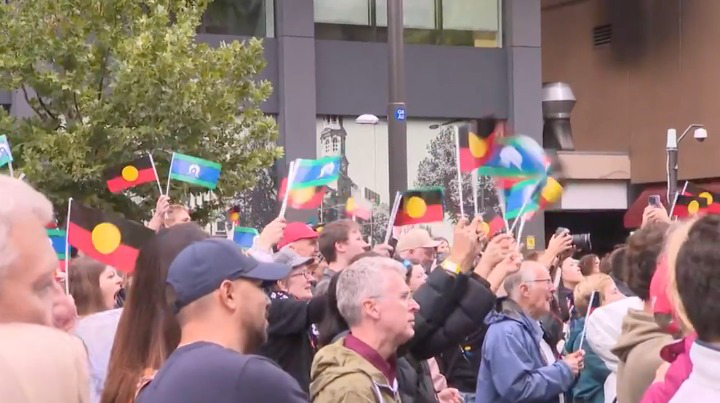
South Australia has made history as the first state to enact an Indigenous Voice to Parliament in a rare public ceremony attended by thousands of people.
President of the Legislative Council Terry Stephens and Commissioner for the First Nations Voice Dale Agius brought the bill before the South Australian Governor Frances Adamson for assent on Sunday.
Heaps of people gathered on the steps of the South Australian parliament in Adelaide to witness the bill pass both the lower and upper house despite the rainy weather, waving Aboriginal and Torres Strait Islander flags and cheering.
#SAVoice the crowd cheers this historic moment, when South Australia’s Indigenous Voice to Parliament gets the final sign off in a special Sunday sitting of parliament pic.twitter.com/GjDfGU46uz
— Candice Prosser (@CandiceProsser) March 26, 2023
Adamson insisted the founders of South Australia had “good intentions” towards Aboriginal people, but said these good intentions never came to fruition. He wanted to “restate my commitment to supporting the process of reconciliation in our state and to working side by side with Aboriginal people and non-Aboriginal people to achieve this goal”.
Can our government officials please actually acknowledge for once that governments can and have been racist?
Prime Minister Anthony Albanese recently said in his own speech that the ill treatment of Aboriginal people has not been “because of a shortage of goodwill or good intentions on any side of politics” which we all know is not true. Stop watering down history and pretending the active genocide of First Nations people was just a miscommunication.
Premier Peter Malinauskas also welcomed the state’s Voice and its recognition of Aboriginal and Torres Strait Islander people.
“For as long as Aboriginal Australia is excluded in sharing in our nation’s prosperity we carry an injustice that weighs on us all,” he said, per Guardian Australia.
“Who knows how we might benefit from drawing on 65,000 years of wisdom.
“I firmly believe that there are more than a few things that this parliament can learn from the longest-living continuous culture that the world has ever seen.”
South Australia has made history – becoming the first State to enact legislation to deliver a First Nations Voice to Parliament. pic.twitter.com/sENiwHeemz
— Peter Malinauskas (@PMalinauskasMP) March 26, 2023
South Australia’s Commissioner for First Nations Voice, Dale Agius, welcomed the bill as a historic win for South Australia.
“For too long our voices have been excluded or dismissed. From today we have the right to be heard, at the highest level of decision-making in this state,” he said, per Guardian Australia.
“After today, more than ever, Aboriginal and Torres Strait Islander people in South Australia will be able to have their say on the decisions that affect their lives.
“And more importantly, they will have the chance to share with the parliament and the government their aspirations for the future. This is about generational change, to be included and to be heard.”
Agius conducted two rounds of consultation with local Aboriginal people, organisations, and communities before the Voice was enacted.
It’s not one hundred per cent clear how it’ll work yet, but what we do know is that the new legislation allows for six regions across the state to elect its own representatives. Two members from each region will then form the State First Nations Voice, where they’ll address either the upper or lower house on legislation that affects First Nations people.
The boundaries of each region have not been finalised, among a bunch of other details, but the state government wants to get it all sorted by the end of the year.
ICYMI, the proposed federal Voice to Parliament has been the topic of much debate among government officials and First Nations activists and will be put to the Australian public’s vote in a referendum later this year.
Basically, it’ll be a body comprised of First Nations people who can advise the parliament on legislation that affects them.
The details on how it’ll work will be confirmed after the referendum, but you can read everything we know about it and its “yes” and “no” campaigns here.



